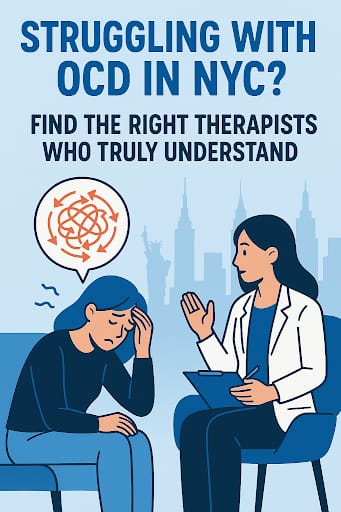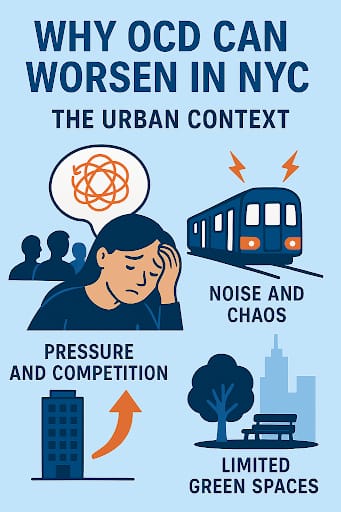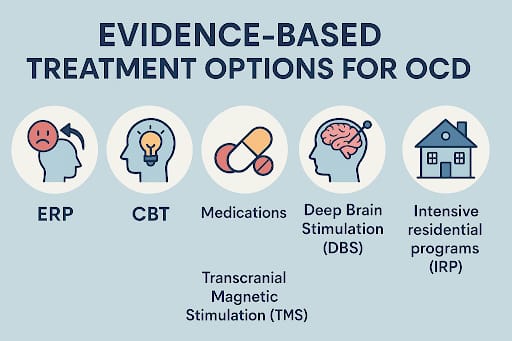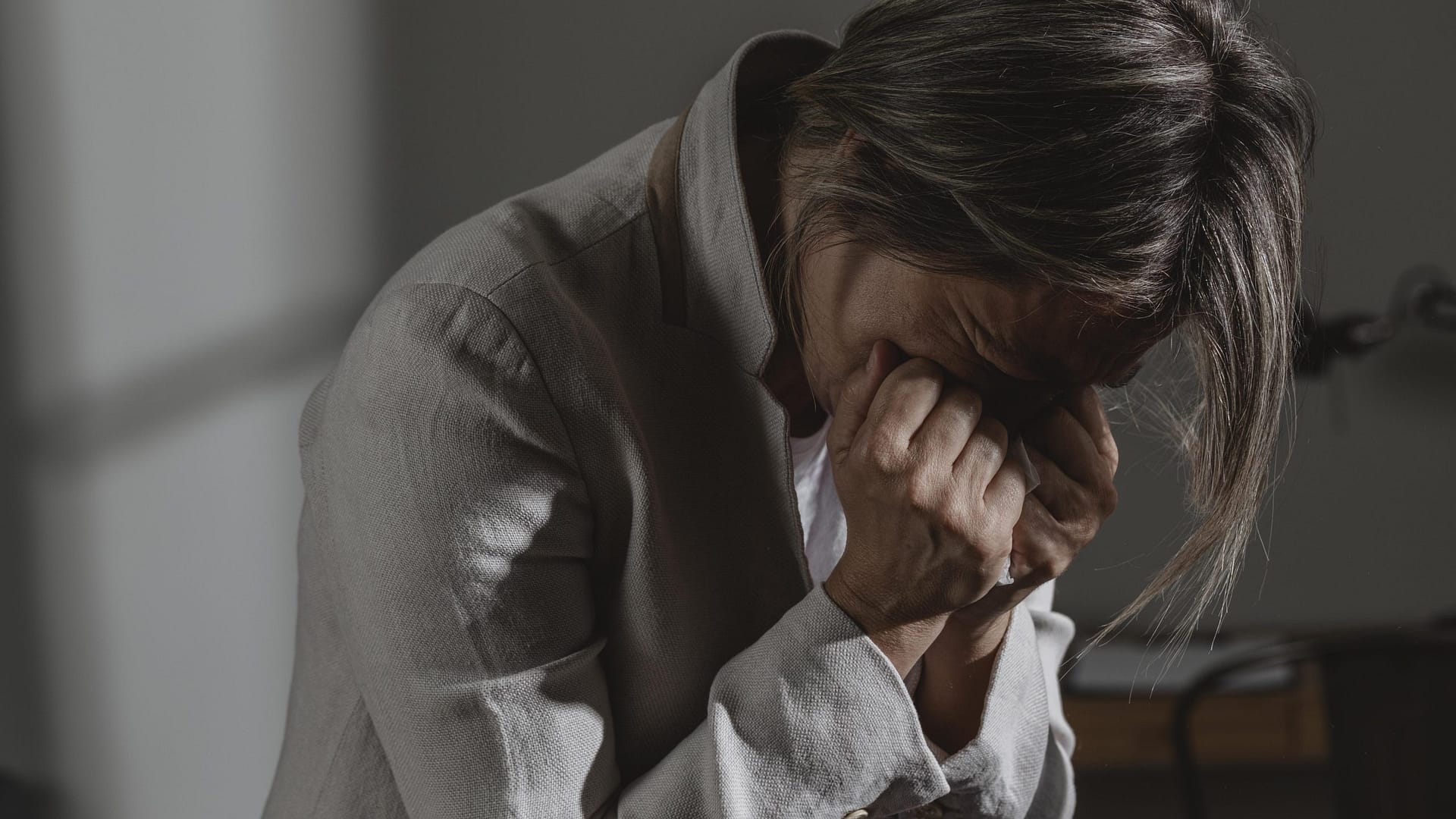
INTRODUCTION
Do you experience stubborn intrusive thoughts, repeated thoughts or actions to the point of dysfunction, and heightened levels of anxiety and stress? It is exhausting to live with Obsessive-Compulsive Disorder (OCD), particularly in notoriously fast-paced New York City, where every day’s stresses may exacerbate symptoms of OCD.
You are not alone, and you can find help right away. The most important part of managing OCD is having a therapist who really understands OCD, as they are critical to long-term relief and healing.
This blog will show you how to find an OCD therapist in New York who specializes in treating OCD and who can provide safe, compassionate, effective treatment tailored to your needs.
What Is Obsessive Compulsive Disorder?
Obsessive Compulsive Disorder (OCD) is a chronic mental illness that severely affects the functioning of an individual. It is classified in “Obsessive-Compulsive and Related Disorders” in the DSM-5. OCD is experienced in 1–2% of the worldwide population.
OCD causes serious distress to the individual, especially when there are often comorbid psychiatric conditions. OCD often paralyzes daily living.
- Obsessions are intrusive thoughts and/or imagery that are distressing.
- Compulsive behaviors are rituals and/or mental behaviors whose purpose is to decrease the anxiety related to the obsession.
Some common obsessional themes include contamination, harm, symmetry (order), and taboo readings (religion/sexual).
Why OCD Can Worsen in NYC: The Urban Context

New York City has a vibrant energy that draws millions of visitors and residents. It also has a number of environmental stressors that may exacerbate symptoms of Obsessive-Compulsive Disorder (OCD).
- The amount of sensory input that comes from taxis, crowded subways, car horns blaring, bright lights, and not to mention a high volume of people can be overwhelming and in itself can heighten distress and heighten obsessive thoughts and compulsions.
- Furthermore, NYC is a busy and high-pressure environment that features an accompanying deep culture of work that not only pays, but drives a high expense of living, little time to recharge and usually an anemic self-care routine.
- Despite being surrounded by millions of people, there is often a sense of emotional isolation for many NYC residents when they do not make close social connections.
- The sense of loneliness can lead individuals with OCD to internalize their struggles, hide the symptoms, and begin a process of shame and resistance to fresh coping tools and treatment options.
Why Finding the Right Therapist Matters
It is crucial to find the right therapist for OCD treatment. The appropriate care will require specialized knowledge and approaches to treating OCD, the condition itself is separate from general anxiety or general depression, it is not going to benefit from talk therapy to the same extent.
- Treatment for OCD typically consists of something called Exposure and Response Prevention (ERP), a specific type of cognitive behavior therapy (CBT), which has been shown to be the best treatment approach for OCD.
- ERP introduces the participant to their fears and teaches them to resist their compulsive behaviors; this is what produces true and long-lasting relief.
- Additionally, OCD is frequently misdiagnosed as some similar symptoms occur with anxiety, perfectionism and/or ADHD, resulting in a delay to adequate treatment.
- Therapists offer an environment that is safe and nonjudgmental, knowing that all thoughts of OCD can be very distressing. OCD Therapists will walk people through the healing process using an informed, compassionate and human-centered approach.
How to Find the Right OCD Therapist in NYC
Finding the right OCD therapist in New York City is about focusing on specialized expertise and accessibility.
- First, look for a therapist who explicitly uses Exposure and Response Prevention (ERP) or Cognitive Behavioral Therapy (CBT). ERP and CBT are the most successful treatments for OCD, therefore explicitly finding a professional that uses these modalities is important.
- Be sure to examine the therapist’s credentials to find one who is affiliated with the International OCD Foundation (IOCDF) or who has specific certifications in OCD treatment. Experience treating OCD specifically is very beneficial.
- When you contact a therapist, you will want to get straight to the point of the specialty area. Ask how many clients they are currently treating that are diagnosed with OCD. Ask if they practice ERP or just utilize CBT.
- You may find that many therapists will offer teletherapy – this could be a great option for someone who struggles to commute or experience anxiety while travelling.
- You can search the IOCDF.org directory, Psychology Today, or NYC WELL to find therapists with experience treating OCD then get connected with the appropriate support and assistance.
Evidence Based Treatment Option for OCD

obsessive-compulsive disorder (OCD) is best treated through a multi-modal treatment approach, which means the use of both psychotherapy and medication to achieve the best results.
- The basis of a psychotherapeutic plan for OCD is cognitive behavioral therapy (CBT), specifically exposure and response prevention (ERP). ERP normally involves a series of therapeutic exposures to some feared stimuli while refraining from compulsive or avoidance behavior.
- On the pharmacotherapy side of treatment, first-line treatment options for OCD include selective serotonin reuptake inhibitors (SSRIs) such as fluoxetine, fluvoxamine, sertraline, and paroxetine, which are typically prescribed at a higher dose than would be prescribed for depression.
- Second-line treatments for refractory cases might include adding an antipsychotic medication such as risperidone or aripiprazole.
- For treatment resistant OCD, advanced treatment options, such as Deep Brain Stimulation (DBS), Transcranial Magnetic Stimulation (TMS), or Intensive residential programs (IRP) may be employed.
Each of these treatment strategies is reflected and expressed by the diverse treatment needs of clients, which are also represented in the multi-faceted and complex nature of OCD.
What to Expect in OCD Therapy in NYC
OCD treatment, most often with Exposure and Response Prevention (ERP), consists of a defined, but illuminating process that occurs in different facets.
- There is an initial assessment phase promising a thorough exploration of your specific obsessions and compulsions through interviews and established assessment tools.
- A psychoeducation phase ensues, enriching your understanding of the workings of OCD, specifically addressing the way anxiety feeds OCD symptoms, and how compulsions anchor the disorder.
- The treatment involves a form of therapy called ERP which facilitates the controlled, gradual exposure of your fears while simultaneously resisting the compulsions that perpetuate the cycle of OCD.
- You will receive acute work for you to do between sessions, which often involves self-monitoring of specific behaviors which enhances the progress between sessions.
- Following the completion of your therapy, in the last phase the therapist introduces relapse prevention plans so you may manage future sources of stress and maintain growth, longevity of treatment success, and resilience.
All of the aspects discussed will help you build the foundation for recovery and improved quality of life.
Final Thought
Managing OCD in New York City may present its own unique challenges, but recovery is definitely achievable.
- Proper treatment that is specifically designed for OCD—especially Exposure and Response Prevention (ERP)—can provide a lasting way out and a new feeling of control.
- You are taking an important step to regain your life from obsessive-compulsive disorder when you get connected with an experienced, compassionate therapist.
- Whether in office or teletherapy, help is available.
Check out resources like the Best OCD Therapists in NYC and find a professional that understands OCD and is committed to helping you through the healing process.
Reference
- National Library of Medicine. (n.d.-b). Obsessive-Compulsive Disorder. https://medlineplus.gov/obsessivecompulsivedisorder.html
- Hezel, D. M., & Simpson, H. B. (2018). Exposure and response prevention for obsessive-compulsive disorder: A review and new directions. Indian Journal of Psychiatry, 61(Suppl 1), S85. https://doi.org/10.4103/psychiatry.IndianJPsychiatry_516_18
- Gragnani, A., Zaccari, V., Femia, G., Pellegrini, V., Tenore, K., Fadda, S., Luppino, O. I., Basile, B., Cosentino, T., Perdighe, C., Romano, G., Saliani, A. M., & Mancini, F. (2022). Cognitive–Behavioral Treatment of Obsessive–Compulsive Disorder: The Results of a Naturalistic Outcomes Study. Journal of Clinical Medicine, 11(10), 2762. https://doi.org/10.3390/jcm11102762
- International OCD Foundation. (2023, December 13). International OCD Foundation | Medications for OCD. https://iocdf.org/about-ocd/treatment/meds/
- Mar-Barrutia, L., Real, E., Segalás, C., Bertolín, S., Menchón, J. M., & Alonso, P. (2021). Deep brain stimulation for obsessive-compulsive disorder: A systematic review of worldwide experience after 20 years. World Journal of Psychiatry, 11(9), 659. https://doi.org/10.5498/wjp.v11.i9.659
- International OCD Foundation. (2024, March 14). International OCD Foundation | Transcranial Magnetic Stimulation (TMS) for OCD. https://iocdf.org/about-ocd/treatment/tms/
- Brennan, B. P., Lee, C., Elias, J. A., Crosby, J. M., Mathes, B. M., Andre, C., Gironda, C. M., Jenike, M. A., Fitzmaurice, G. M., & Hudson, J. I. (2014). INTENSIVE RESIDENTIAL TREATMENT FOR SEVERE OBSESSIVE-COMPULSIVE DISORDER: CHARACTERIZING TREATMENT COURSE AND PREDICTORS OF RESPONSE. Journal of Psychiatric Research, 56, 98. https://doi.org/10.1016/j.jpsychires.2014.05.008






